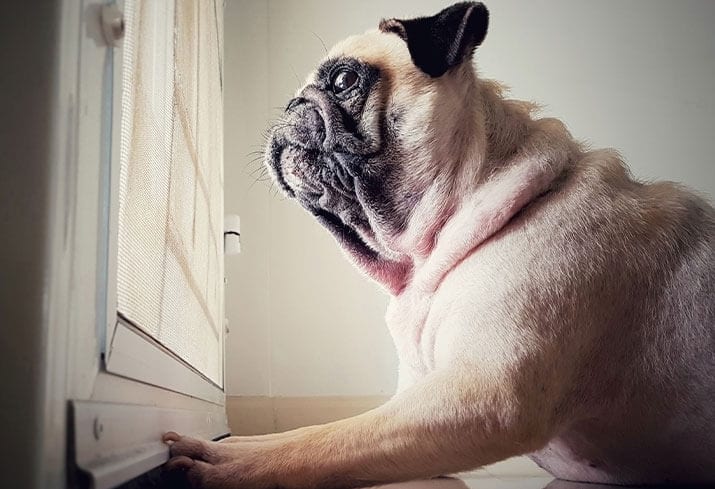One of the most common complaints one hears from dog owners is that their dog has become destructive and badly behaved when they are alone. We hear this from both long-time owners and new owners—everything is going great, until they come home and the house is torn apart! Dogs won’t stop barking, howling, tearing couch cushions apart, urinating defecating, chewing, or trying to escape whenever we leave them alone! What is to be done?
Many initially believe these problems stem from unruly dogs that don’t know how to behave. While this is sometimes the case, often the problem is overlooked. Many dogs develop separation anxiety when their owners leave.
But what is separation anxiety in dogs? What caused it? And how do we make them stop tearing apart the house every time we leave?
What is Dog Separation Anxiety?
Separation anxiety develops because of dogs becoming nervous and upset when their owners leave. Experts aren’t yet sure why some dogs develop separation anxiety and not others—sometimes it’s due to trauma, but other times, it’s more confusing. It appears dogs can develop anxiety like humans do—without reason or cause.
However, there are some common reasons that dogs may be feeling uncomfortable with being left alone, including:
- Changes, such as a change in owner, change in residence, change in schedule, or a new household member
- Medical causes such as incontinence or new medications
- Behavior problems like incomplete house training, urine marking, juvenile destruction, excitement urination, or boredom.

Common Symptoms of Separation Anxiety
To determine if your dog is suffering from separation anxiety, it’s important to examine the common symptoms.
Urinating and Defecating
Many dogs with separation anxiety will urinate or defecate in parts of the house they’re not supposed to when their owner is gone. If their urination or defecation around the house is due to separation anxiety, it will likely not happen while their owner is in the house.
Destruction (Such as Chewing and Digging)
Dogs may engage in forms of destruction, like chewing or digging, when their owners are gone. These behaviors are serious, not only because they damage property, but because they can injure your dog, causing anything from broken teeth to cuts.
Unwanted Noise (Such as Barking or Howling)
Dogs with separation anxiety will engage in loud, persistent howling or barking, but typically only when their owner has left them alone. Dogs with separation anxiety will not usually bark or howl persistently if their owner is home.
Attempts to Escape
Dogs with separation anxiety who are left alone for long periods may attempt to escape. These attempts are serious, as they are often extremely dangerous and can result in severe injury to your pet, or even death.
Pacing
When left alone dogs with separation anxiety may pace back and forth out of fear and worry. They will likely not do this if their owner is home.
How to Treat Dog Separation Anxiety
There are many different methods for treating dog separation anxiety. Choosing a method will depend on many things: the severity of your dog’s anxiety, the suspected cause of their anxiety, and the symptoms they’re known to engage in. Please read through all the treatment options before deciding which one may be right for you and your pet.
Counterconditioning
If your dog has only a very mild case of separation anxiety, it could be worked out with counterconditioning. Counterconditioning is a method used to change the feelings your dog associates with you leaving them alone from bad feelings into good feelings. The idea is to turn alone time into a treat, or, if not a treat, at least something that is not terrible. Try tactics like giving your dog treats at certain times when they may otherwise be experiencing anxiety, so that they will learn to associate certain signs (like you putting on your shoes to leave) with treats, instead of bad feelings. Again, this is only a good course of action if your dog has mild anxiety, because dogs with moderate to severe anxiety will probably become too anxious to enjoy their treat as soon as you leave.
Desensitization
If your dog’s anxiety is more moderate or severe, they may require an entire desensitization plan. There are many ways to do this, but it’s a course of action you’ll probably want to speak with a veterinarian about. The general idea is that in order to dispel your dog’s separation anxiety, you can start with only leaving them alone for short times, and gradually work up to leaving them alone longer. A lot of training and behavioral work can go into this, however, so you’ll want to speak to a veterinarian and do more research before proceeding with this plan.
Crate Training
Crate training can be incredibly helpful for dogs with anxiety, but it can also be incredibly harmful. In this case, it’s very important to observe your dog, and try to understand what soothes their anxiety, before deciding if crate training is the right option or not. You can also try using a gate to confine your dog to just one room.
Exercise
One idea for dogs with separation anxiety is to give them lots and lots of stimulation and exercise right before you leave. Taking your dog for a run or brisk walk right before you go to the grocery store could cause them to sleep the whole time you’re gone! In addition, dogs who get lots of exercise are happier, healthier, and often better behaved.
Medications
It’s important to always consult a veterinarian before giving your dog any kind of medication.
In addition, medication shouldn’t be the first response to a dog’s behavioral problem or separation anxiety. Ideally, you should seek solutions together, and try to get to the root of the problem first. However, sometimes medication can be helpful, especially for dogs with severe anxiety. In this case, speak to your vet about medications that may help.
Don’t Punish Your Dog for Their Separation Anxiety
Whichever treatment plan you decide to pursue, it is extremely important that you never scold or punish your dog for aspects of their anxiety that they cannot control. This will only make the problem worse, as your dog will become more upset if they think you’re mad at them.
Call your Northern Pike Veterinary Hospital veterinarian at 412-373-8580 for help with your dog’s separation anxiety!

